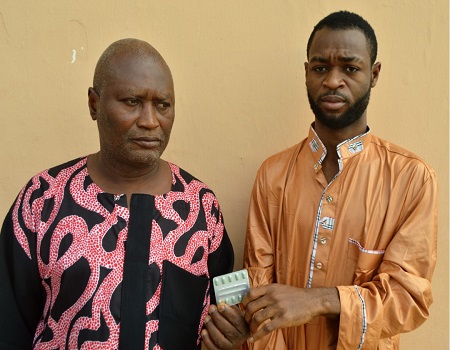An attempt by a 60-year-old fish-farmer, Muyiwa Otuyalo, to smuggle in substance believed to be hard drug for his son, Damilola Otuyalo, who is currently in the custody of the Economic and Financial Crimes Commission (EFCC), Ibadan zonal office, was bunked by the officers of the commission on Monday.
This was disclosed in a statement issued by the Acting head, media and publicity, EFCC, Wilson Uwujaren, on Tuesday.
Uwujaren disclosed that the “older Otuyalo was at the premises of the EFCC in Ibadan on Monday, supposedly to visit his son. But while discussing with the son, an officer noticed that he brought out a sachet of tablets and handed the same to him. The officer subsequently raised an alarm which led to the confiscation of the drug.
“When the in-house nurse was called upon for assessment of the content, it was revealed that the said item was Rohypnol, a tranquillizer used under strict prescription for treatment of severe insomnia and assist in anaesthesia.”
The drug, according to the EFCC spokesperson is said to “possess high sedative effect and is rarely used except when prescribed by licensed medical officers.”
ALSO READ: UNILORIN donates classrooms, boreholes, toilets to Fulani community
Otuyalo had since been arrested.
The younger Otuyalo, the statement further revealed “was recently arrested after a criminal case of money laundering detected in the United Kingdom was reported against him.
“The case which involved £45,000 was a fragment of a wider one involving about £500,000 for which he has been declared wanted by the London’s Metropolitan Police.
“He has been on the wanted list of the International Police, Interpol before the petition was filed at the EFCC, Ibadan zonal office.
“Officers of the Nigerian Interpol were already in contact with the commission in respect of the said case before the suspect’s father attempted to smuggle in the hard drug for him.”
He added that further investigations are ongoing, even as the “commission intends to hand him over to the National Drug Law Enforcement Agency, NDLEA, for possible prosecution of the suspected narcotic case.”






